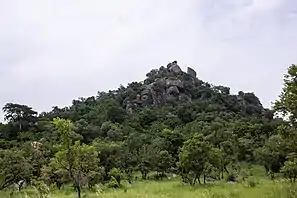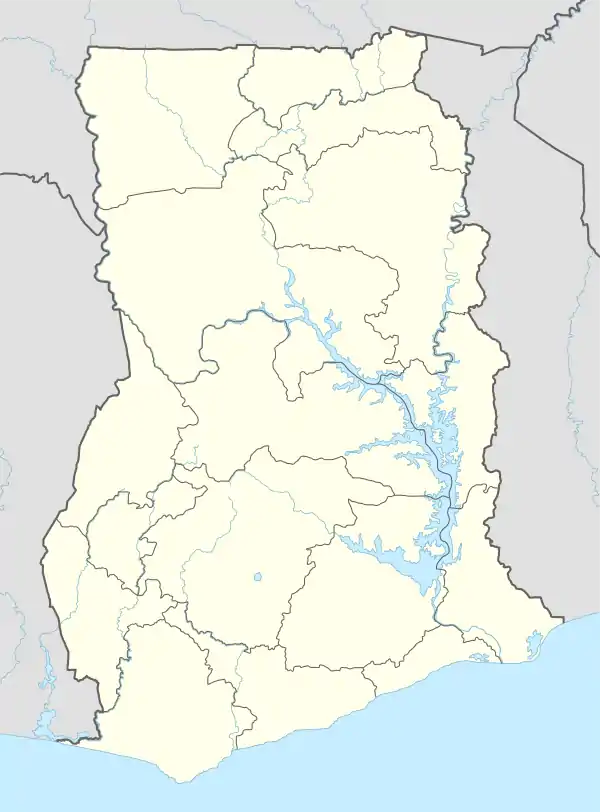Shai Hills Resource Reserve
Shai Hills Resource Reserve is a resource reserve located in Doryumu in the Shai Osudoku District all in the Greater Accra Region. It was established in 1962 with area of 47 square kilometres (4,700 ha; 18 sq mi) which was later extended to 47 square kilometres (4,700 ha; 18 sq mi) in 1973.[2][3][4][5][6]

| Shai Hills Resource Reserve | |
|---|---|
IUCN category VI (protected area with sustainable use of natural resources) | |
 Location in Ghana | |
| Location | Doryumu, Greater Accra Region, Ghana |
| Nearest city | Accra[1] |
| Coordinates | 5.909409°N 0.065348°E |
| Area | 51 km2 (5,100 ha; 20 sq mi) |
| Established | 1962[2] |
.jpg.webp)
History
The area was declared Forest Reserve in 1962 with total area of 47 square kilometres (4,700 ha; 18 sq mi) which was later expanded to 51 square kilometres (5,100 ha; 20 sq mi) in 1973 till present. It was made a Game Production Reserve in 1971.[2] The protected area was home to the Shai people before they were ejected by the British in 1892, remains of Shai peoples works can still be found at the reserve.[1]
Recreation
The Reserve has been a host to recreational activities such as Picnics, and in 2017 hosted the National Biking & Abseil Festival.[7][8]
Location
Shai Hills Resource Reserve is located along the Tema–Akosombo road. It is about 57 kilometres (35 mi) from Accra, the capital city of Ghana making it the closest wildlife reserve to Accra.[1]
Threats
The reserve is bedeviled with a lot of threats such as danger from speeding vehicles because some of the baboons find their way to the highway. The reserve is also situated close to a stone quarry and this also affects the day-to-day activities of the park.[9]
Touring
The Shai Hills Resource Reserve is covered with grassland and low dry forest vegetation. There are nearly 400 plant species spread on the 5 separate hills at the Shai Hills Resource Reserve. There are nearly dozens of primary animal species including antelopes, bats, birds (such as violet Turaco, Paradise Flycatcher, Green Turaco Red-billed Hornbill, Yellow-fronted Tinkerbird, and Red-necked Buzzard), baboons, cats, duiker, guinea fowls, kobs, green monkeys, monitor lizards, African python, royal python, and zebras.[10]
Visits
Visitors can visit the attractive region of hilly rocks and grassy plains reserve all year round. Touring the reserve during the early rainy season (May through July) could be difficult because of the rough road condition. Popular activities include game viewing, bird watching, nature walking, and rock climbing.[13][14]
References
- Braggs, Philip (2007). Ghana: The Bradt Travel Guide. Bradt Travel Guides. p. 422. ISBN 978-1841622057.
- Parks and reserves of Ghana : management effectiveness assessment of protected areas. IUCN. p. 55. ISBN 9782831712772.
- Editor (2016-02-24). "Greater Accra Region". touringghana.com. Retrieved 2019-05-21.CS1 maint: extra text: authors list (link)
- "Shai Hills Resource Reserve". Retrieved 2019-05-22.
- "Shai Hills Resource Reserve". shai-hills-resource-reserve.business.site. Retrieved 2019-05-22.
- Ghana, Business Day. "Calm Shai Hills Resource Reserve - News Ghana". www.newsghana.com.gh/. Retrieved 2019-05-22.
- "World-Class Adventure Tourism hits Shai Hills Reserve". www.myjoyonline.com. 2017-04-19. Retrieved 2019-05-22.
- "Shai Hills Reserve To Be Developed Into An Eco-Tourism Site". Modern Ghana. 2016-04-14. Retrieved 2019-05-22.
- "The Shai Hills Resource Reserve... an untapped national 'gold mine'". www.graphic.com.gh. Retrieved 2019-05-22.
- "The socio-cultural impact of ecotourism on park-adjacent communities in Ghana". ResearchGate. Retrieved 2019-07-18.
- Acquah, Emmanuel (July 2019). "The socio-cultural impact of ecotourism on park-adjacent communities in Ghana. African Journal of Hospitality". Tourism and Leisure. 6: 14.
- "Species distribution of kobs (Kobus kob) in the Shai Hills Resource Reserve: an exploratory analysis | Raymond Agyepong Antwi | Request PDF". ResearchGate. Retrieved 2019-07-18.
- "Shai Hills Reserve". Visit Ghana. Retrieved 2019-07-18.
- "General Travel Information". www.isanet.org. Retrieved 2019-07-18.